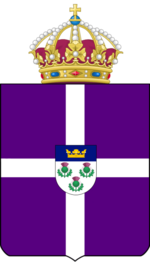Foreign relations of Caldia
This article is incomplete because it is pending further input from participants, or it is a work-in-progress by one author. Please comment on this article's talk page to share your input, comments and questions. Note: To contribute to this article, you may need to seek help from the author(s) of this page. |
 |
|---|
| This article is part of a series on the politics and government of Caldia |
|
|
The foreign policy of Caldia is based on the principles of non-alignment in times of peace and neutrality in wartime. Remaining outside of military alliances allows Caldia to maintain neutrality in the event of war. This premise includes the belief that non-involvement is the best serves Caldia's national security. However, it is required by the common defense clause of the Treaty of Kesselbourg to come to the aid of EC member-states should one be targeted by a declaration of war. While this breaks with the policy of non-alignment, Caldia is politically and economically integrated into the Euclean Community. The Caldish security doctrine allows for cooperation in the event of threats against peace and security. Issues of Euclean security are considered to be issues of Caldish national security, allowing Caldia to participate in the common defense clause. In 2017, the Caldish government spend 1.5% of the Gross National Product on defense. This is relatively low compared to many other Euclean nations.
Community of Nations
Caldia has been a member of the Community of Nations since its foundation in February 1935. It has actively participated in the organization, leading a number of efforts in the International Assembly, serving as an elected member of the Security Committee on several occasions, and sending Seán Fitzgerald to serve as Secretary-General from 1955 60 1961. The Caldish government views international cooperation and peacekeeping efforts through the Community of Nations as essential to maintaining global stability.
The CN maintains an office in Garrafrauns, and the Treaty for the End of Nuclear Armament Proliferation in the World was negotiated in Garrafrauns and signed in Shanbally in 1965.
Euclean Community
Caldia joined the Euclean Community under the leadership of Taoiseach Seamus Mac Amhlaidh in 1955 alongside Varienland and Werania. The application was submitted and negotiations began in 1952. Mac Amhlaidh pursued a policy of reproach with Estmere and Werania that allowed Caldia to join the EC. The decision was met with controversy as some argued the nature of the common defense clause would force the Caldish government to go back on its policy of non-alignment. However, others viewed Caldish membership as natural and favored economic cooperation with Eastern Euclea. To address the controversy, Mac Amhlaidh declined to join the Euclean Defense Treaty Organization and secured the right to opt out of any future military agreements for the next 50 years.
Since joining, Caldia has been an active member of the EC. It joined the Euclean Monetary Union and the Euclozone in 1983 and participates in all EC organizations and institutions. Under Alexis Walker, the Caldish government became increasingly pro-Euclea. Caldia sent Caitríona Níc Donnchadh to serve as the High Commissioner from 2014 to 2017. Walker has served as the elected President of the Euclean Community since 2017.